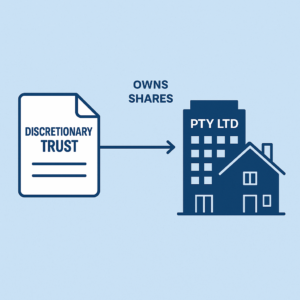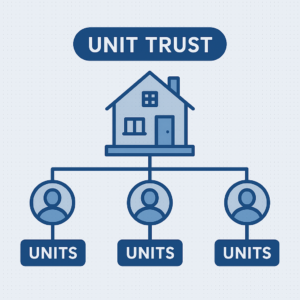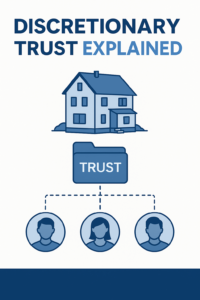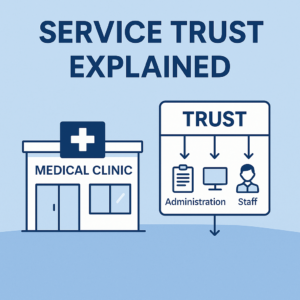Building and Passing Down a Family Business: How a Discretionary Trust Can Secure Your Legacy
Michael has a dream of building a successful family business that he can pass down to his son. He envisions a future where his son takes the reins, ensuring that the business remains within the family for generations to come. However, Michael is concerned about the potential tax implications of transferring business assets directly, which could trigger capital gains tax (CGT) and stamp duty. Moreover, he wants to ensure that his son is protected from potential legal claims that could threaten the business. To achieve these goals, Michael can use a discretionary trust. In this blog, we’ll explore how a discretionary trust can provide a tax-effective and secure way to transfer control of a family business, safeguarding it for the future.

The Challenge: Transferring a Family Business Without Tax Burdens
Passing control of a business to the next generation can be a complex process. Michael’s main concerns are:
- Tax Implications: Directly transferring business assets to his son could result in substantial tax liabilities. CGT and stamp duty are significant costs that could reduce the value of the business assets and place a financial burden on both Michael and his son.
- Protecting the Business: In addition to tax concerns, Michael is aware of the need to protect the business from potential legal claims. If his son were to face personal legal issues or be sued, he wants to ensure that the business assets are not at risk.
Michael needs a strategy that allows him to pass on control of the business smoothly and tax-efficiently, while also safeguarding the business from potential threats.
The Solution: Using a Discretionary Trust to Manage and Transfer Business Control
To address these challenges, Michael can establish a discretionary trust to operate his family business. This strategy provides both tax efficiency and protection for the business assets. Here’s how Michael can use a discretionary trust to achieve his goals:
- Operating the Business Through a Discretionary Trust:
Michael sets up a discretionary trust to hold and operate his family business. The business assets are owned by the trust, which separates them from Michael’s personal estate. This structure ensures that the business is protected from any personal legal claims against Michael and provides a layer of security for the business assets. - Transferring Control to His Son:
When the time is right, Michael can transfer control of the trust, and thus the business, to his son. This is achieved by appointing his son as the appointor of the trust and making him the director and shareholder of the trustee company. The appointor has the power to appoint or remove trustees, effectively giving his son control over the trust and its assets. By becoming the director of the trustee company, his son gains the authority to manage the business operations. - Avoiding CGT and Stamp Duty:
By transferring control of the trust, rather than the business assets directly, Michael can avoid the CGT and stamp duty that would typically be associated with the transfer of business ownership. This approach allows for a smooth and tax-efficient transition, enabling his son to take over the business without incurring substantial tax liabilities. - Protection Against Creditors:
As the business assets are owned by the discretionary trust, they are not considered personal assets of Michael’s son. This provides a layer of protection against potential legal claims. If his son were to face personal financial difficulties or legal issues, the business assets would be shielded from creditors, ensuring the business remains secure and operational.
Key Considerations: Setting Up and Managing a Discretionary Trust
While a discretionary trust provides a robust solution for managing and transferring a family business, Michael should consider the following to ensure effective setup and management:
- Legal and Tax Advice: Establishing a discretionary trust involves navigating legal, tax, and administrative complexities. Michael should consult with legal and financial professionals to ensure the trust is structured correctly, complies with all relevant regulations, and meets his family’s needs.
- Drafting the Trust Deed: The trust deed is a critical document that outlines the trust’s rules and provisions, including how and when control can be transferred. Drafting this deed carefully ensures that Michael’s objectives are met and that his son’s interests are protected.
- Ongoing Trust Management: Managing a trust requires ongoing attention to compliance, record-keeping, and adherence to tax laws. Michael, as the initial trustee, should ensure that the trust operates effectively and in the best interests of the business and his family.
The Benefits: Securing the Future of the Family Business
Using a discretionary trust offers Michael several significant benefits:
- Tax Efficiency: Transferring control of the trust rather than the business assets themselves allows Michael to avoid CGT and stamp duty, ensuring a tax-efficient transfer of ownership.
- Asset Protection: The trust structure protects the business from potential personal legal claims against his son, safeguarding the business assets and ensuring continuity of operations.
- Controlled Transition of Ownership: The trust provides a structured way to pass on the business, allowing Michael to remain involved while gradually transitioning control to his son. This ensures that his son is ready to take on the responsibility when the time comes.
Conclusion: Building a Legacy with Discretionary Trusts
For parents like Michael, who wish to build a family business and pass it on to the next generation, a discretionary trust offers a powerful solution. By operating the business through a trust and transferring control strategically, Michael can ensure a tax-efficient and secure transition of the business to his son. This approach not only protects the business assets from potential legal claims but also provides peace of mind, knowing that the family business is safeguarded for the future.
If you’re considering building a family business or planning to pass on your existing business to your children, consulting with legal and financial professionals about setting up a discretionary trust is a wise move. With the right planning, you can secure your family’s financial future and create a lasting legacy for generations to come.
Others
-
October 20, 2025 Buying Property Under Your Personal Name in Australia: Pros and Cons
-
October 18, 2025 Service Trust Business Structure in Australia




